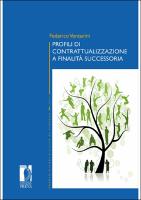Profili di contrattualizzazione a finalità successoria
Abstract
The book aims to study the relationship between the contractual instrument and succession law, in order to identify the categories into which the general device of the succession contract currently seems to be divided. The book starts from an analysis of the 'bans' on succession settlements as per art. 458 of the Italian Civil Code, before going on to examine the categories of 'alternative instruments to wills' and 'exceptionally admitted mortis causa deeds (other than wills)' (that is, the first two forms taken on by the wide-ranging genus of contracts for the purpose of succession). Then it deals with the institution of the 'family settlement' (articles 768-bis of the Italian Civil Code), a device which can be traced back to the phenomenon of 'anticipated succession' (constituting the 'third form' of contracts for the purpose of succession). Having clarified the regulations as well as giving a systematic outline of the institution, the analysis then concentrates on the relationship between the aforesaid contract and the sphere of 'necessary succession'. The concluding part of the book contains an outline of a set of applicative models for the category of anticipated succession; additional innovative models distinct from the current formulation in articles 768-bis et seq. of the Italian Civil Code, which therefore enable the interpreter to make out, from a de jure condendo perspective, the possible lines of development both of contracts for the purpose of succession and for necessary succession.


 Download
Download Web Shop
Web Shop